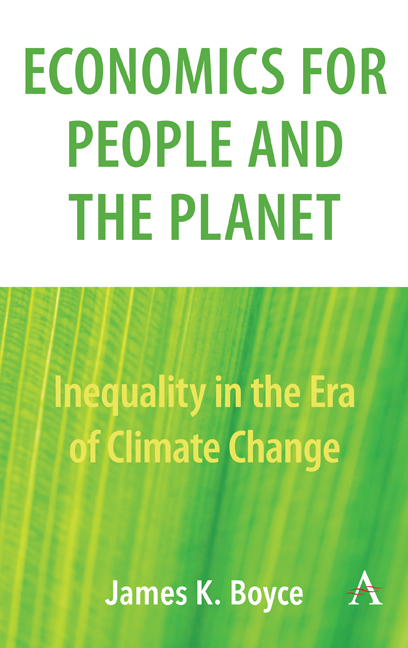Book contents
- Frontmatter
- Contents
- List of Illustrations
- Acknowledgements
- Part I Rethinking Economics and the Environment
- Part II Environmental Injustice
- Part III Climate Policy
- Chapter 17 Smart Climate Policy
- Chapter 18 Investment in Disadvantaged Communities
- Chapter 19 Dividends for All
- Chapter 20 Truth Spill
- Chapter 21 Four Pillars of Climate Justice
- Chapter 22 The Perverse Logic of Offsets
- Chapter 23 Climate Policy as Wealth Creation
- Chapter 24 The Carbon Dividend
- Chapter 25 Keeping the Government Whole
- Chapter 26 Air Quality Co-benefits in Climate Policy
- Chapter 27 Climate Adaptation: Protecting Money or People?
- Chapter 28 Forging a Sustainable Climate Policy
- Notes
- Publication History
- Index
Chapter 18 - Investment in Disadvantaged Communities
from Part III - Climate Policy
Published online by Cambridge University Press: 12 February 2019
- Frontmatter
- Contents
- List of Illustrations
- Acknowledgements
- Part I Rethinking Economics and the Environment
- Part II Environmental Injustice
- Part III Climate Policy
- Chapter 17 Smart Climate Policy
- Chapter 18 Investment in Disadvantaged Communities
- Chapter 19 Dividends for All
- Chapter 20 Truth Spill
- Chapter 21 Four Pillars of Climate Justice
- Chapter 22 The Perverse Logic of Offsets
- Chapter 23 Climate Policy as Wealth Creation
- Chapter 24 The Carbon Dividend
- Chapter 25 Keeping the Government Whole
- Chapter 26 Air Quality Co-benefits in Climate Policy
- Chapter 27 Climate Adaptation: Protecting Money or People?
- Chapter 28 Forging a Sustainable Climate Policy
- Notes
- Publication History
- Index
Summary
Community benefit funds that channel carbon revenues into environmental investments in disadvantaged communities can promote both equity and efficiency. Based on a memorandum written for the Economics and Allocation Advisory Committee of the California Air Resources Board and California Environmental Protection Agency.
The California Global Warming Solutions Act of 2006 (Assembly Bill 32) mandates that the California Air Resources Board (CARB) should seek to channel investment to the state's most disadvantaged communities:
The state board shall ensure that the greenhouse gas emission reduction rules, regulations, programs, mechanisms, and incentives under its jurisdiction, where applicable and to the extent feasible, direct public and private investment toward the most disadvantaged communities in California and provide an opportunity for small businesses, schools, affordable housing associations, and other community institutions to participate in and benefit from statewide efforts to reduce greenhouse gas emissions.
In addition, the Act mandates that CARB should consider localized impacts of co-pollutants that are emitted along with carbon dioxide when fossil fuels are burned:
Prior to the inclusion of any market-based compliance mechanism in the regulations, to the extent feasible and in furtherance of achieving the statewide greenhouse gas emissions limit, the state board shall do all of the following: (1) Consider the potential for direct, indirect, and cumulative emission impacts from these mechanisms, including localized impacts in communities that are already adversely impacted by air pollution. (2) Design any market-based compliance mechanism to prevent any increase in the emissions of toxic air contaminants or criteria air pollutants.
Disadvantaged communities often are disproportionately impacted by air pollutants, including co-pollutants generated by the use of fossil fuels. One way to fulfill these mandates is to allocate a share of allowance value (that is, revenue from auctions of carbon emission permits) to these communities for the purpose of environmental improvements.
This use of allowance value primarily involves investment, but it also can be considered a form of compensation in that a community's eligibility to receive benefits rests on its disadvantaged status, including disproportionate pollution exposure. Eligibility for compensation does not require that AB 32 causes an increase in co-pollutants in the localities–an outcome specifically prohibited in the section of the Act quoted above–but rather that disproportionate impacts relative to other localities persist after AB 32 implementation.
- Type
- Chapter
- Information
- Economics for People and the PlanetInequality in the Era of Climate Change, pp. 87 - 94Publisher: Anthem PressPrint publication year: 2019



